[Business Continuity Strategy] [Minimum Resources Required] [T3]

CBF 2: Counselling and Psychological Support
In times of crisis or disaster, HopeHouse must maintain its capacity to deliver core services to its vulnerable residents, particularly in the domain of Counselling and Psychological Support.
This critical business function (CBF 2) plays a central role in safeguarding the emotional well-being and mental health of residents, many of whom have already experienced trauma or instability before seeking shelter at HopeHouse.
This chapter identifies the minimum resource requirements necessary to sustain the Sub-CBFs under CBF 2 during a disaster scenario. These requirements cover human resources, workspace, technology, and critical equipment that are vital for the continuity of care.
By pre-establishing resource needs across recovery locations, HopeHouse ensures it can provide uninterrupted psychological support, maintain residents’ trust, and prevent exacerbation of mental health crises during times of disruption.
Here is the table for Part 3: BCS - T3 Minimum Resources Required during a Disaster for the Sub-CBFs under CBF 2: Counselling and Psychological Support of HopeHouse:
|
Sub-CBF Code |
Sub Critical Business Function |
Recovery Location |
Minimum Resource Requirements Per Function Per Recovery Location (No of Staff) |
|
2.1 |
Initial Psychological Assessment and Case Planning |
Alternate HopeHouse Site |
• Staff: 2 • Seats: 2 • Telephones: 1 • PC/Laptops: 2 • Others: Assessment forms (min 50 copies), secure filing cabinet (1) |
|
2.2 |
2.2 Individual Counselling Sessions |
Partner Agency Facility |
• Staff: 2 • Seats: 2 • Telephones: 1 • PC/Laptops: 1 • Others: Private counselling room (1), basic stationery (notebooks, pens - min 10 sets) |
|
2.3 |
2.3 Group Therapy and Peer Support |
Temporary Community Centre |
• Staff: 1 facilitator, 1 support staff • Seats: 10 • Telephones: 1 • PC/Laptops: 1 • Others: Whiteboard (1), audio system (1), session handouts (min 20 copies) |
|
2.4 |
2.4 Crisis Intervention and Emotional Stabilisation |
Alternate HopeHouse Site |
• Staff: 2 • Seats: 2 • Telephones: 2 • PC/Laptops: 1 • Others: Emergency contact list (1 copy), access to private space (1 room), basic first aid/emergency kit (1) |
|
2.5 |
2.5 Progress Monitoring and Reassessment |
Partner Agency Facility |
• Staff: 1 • Seats: 1 • Telephones: 1 • PC/Laptops: 1 • Others: Case files (secure access to 10+ cases), evaluation forms (min 30 copies) |
|
2.6 |
2.6 External Referrals and Specialist Coordination |
Remote Work Setup / Mobile |
• Staff: 1 • Seats: 1 • Telephones: 1 • PC/Laptops: 1 (with internet) • Others: Access to referral directory (digital), secure email/communications platform |
|
2.7 |
2.7 Post-Care Emotional Support and Reintegration Planning |
Temporary Shelter Facility |
• Staff: 1 • Seats: 2 • Telephones: 1 • PC/Laptops: 1 • Others: Reintegration planning tools/checklists (min 10 copies), private discussion space (1 room), outreach kits (min 5 sets) |
This table provides a practical and scalable baseline for the minimum resources required by HopeHouse to sustain critical operations during a disaster scenario, following ISO 22301 best practices and aligned with BCM Institute’s guidelines.
Summing Up ...
The effective continuation of Counselling and Psychological Support during a disaster is not only a legal and ethical obligation for HopeHouse but also a foundational pillar of its mission to provide holistic care.
The resource requirements outlined in this chapter reflect a realistic and prioritised approach to recovery planning, ensuring that the most essential elements—qualified staff, private spaces, communication tools, and therapeutic materials—are available at alternate or temporary locations.
By proactively identifying these needs, HopeHouse enhances its organisational resilience and ensures that psychological support services remain available when residents need them most.
These resource plans will be periodically reviewed and tested as part of the organisation’s broader Business Continuity Management (BCM) framework.
More Information About Business Continuity Management Courses
To learn more about the course and schedule, click the buttons below for the BCM-300 Business Continuity Management Implementer [BCM-3] and the BCM-5000 Business Continuity Management Expert Implementer [BCM-5].




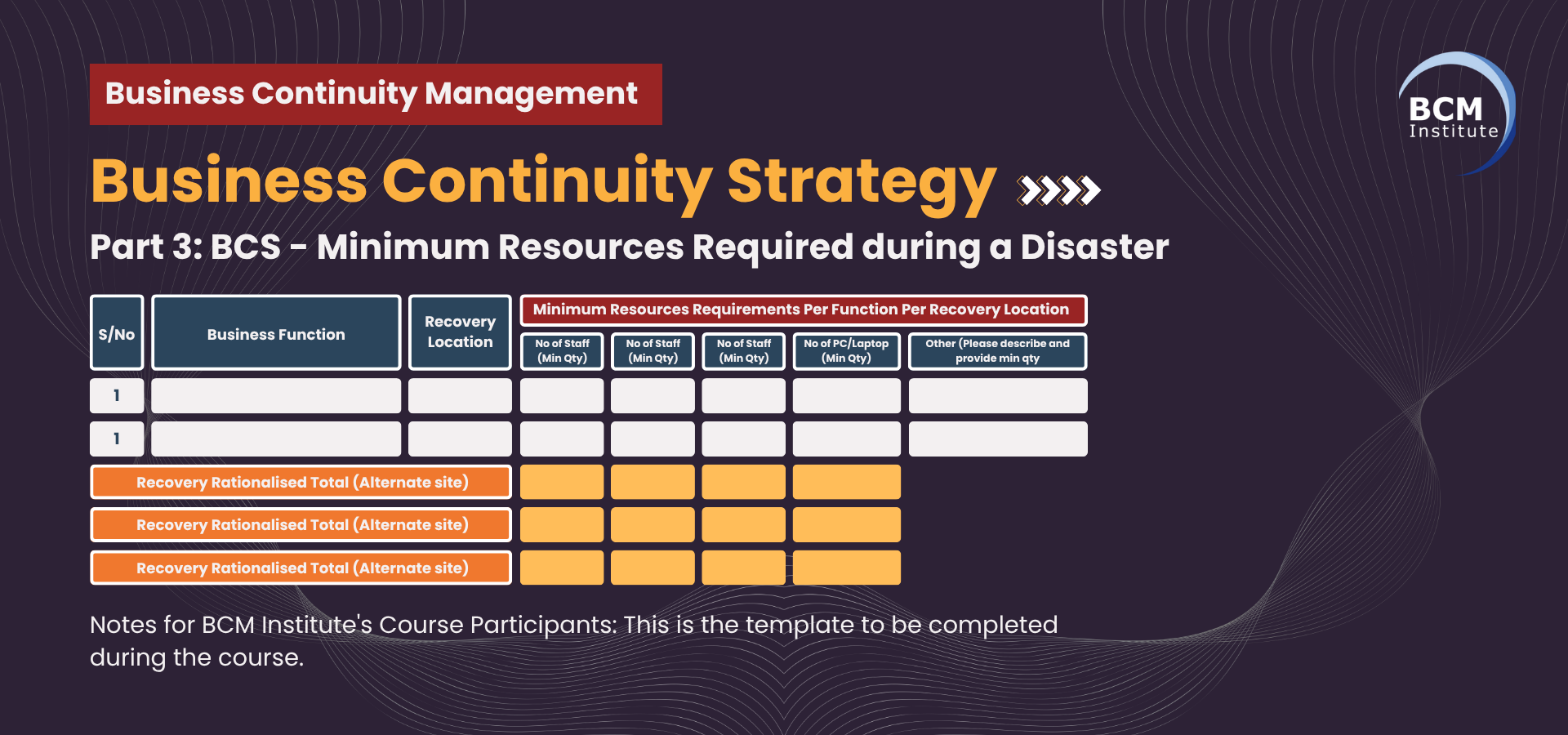
![[BCM] [HH] [E3] [BCS] [T3] [CBF] [1] Minimum Resources Required during a Disaster](https://no-cache.hubspot.com/cta/default/3893111/97a4ab91-3eda-44df-b341-6e5d4ef311fd.png)
![[BCM] [HH] [BIA] MBCO Corporate MBCO](https://no-cache.hubspot.com/cta/default/3893111/c69ab48c-f2a4-4448-aa36-dab7ef97523e.png)
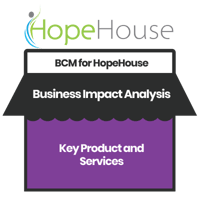
![[BCM] [HH] [E3] [RAR] [T1] List of Threats](https://no-cache.hubspot.com/cta/default/3893111/1ef4bbea-8438-4853-9dd4-e9ef4c48e1b1.png)
![[BCM] [HH] [E3] [RAR] [T2] Treatment and Control](https://no-cache.hubspot.com/cta/default/3893111/208f472a-0f0e-443b-aadf-e0c6483ff8e2.png)
![[BCM] [HH] [E3] [RAR] [T3] Risk Impact and Likelihood Assessment](https://no-cache.hubspot.com/cta/default/3893111/89337c47-a337-4077-9ee3-a4c0d222bc00.png)
![[BCM] [HH] [E3] [BCS] [T1] Mitigation Strategies and Justification](https://no-cache.hubspot.com/cta/default/3893111/d17b595b-9bfc-4810-a8d5-9591e467fd62.png)
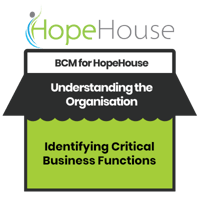
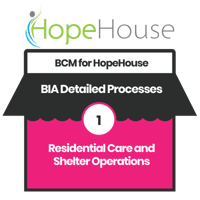
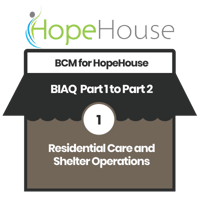
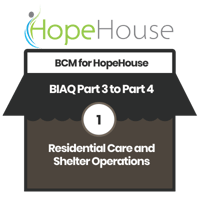
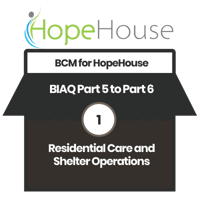
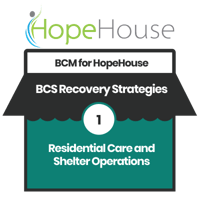
![[BCM] [HH] [E3] [PD] [CBF] [1] Residential Care and Shelter Operations](https://no-cache.hubspot.com/cta/default/3893111/43ea4330-255a-4ea5-82d9-bba2665e62cd.png)


![Register [BL-B-3]*](https://blog.bcm-institute.org/hs-fs/hubfs/hub_generated/resized/19a8306f-6b76-45ff-8585-95111f393aeb.png?width=200&height=56&name=19a8306f-6b76-45ff-8585-95111f393aeb.png)



![FAQ [BL-B-3]](https://blog.bcm-institute.org/hs-fs/hubfs/hub_generated/resized/9b7f5669-8ad6-450b-a98f-5f5d49ebfc8e.png?width=150&height=150&name=9b7f5669-8ad6-450b-a98f-5f5d49ebfc8e.png)
![Email to Sales Team [BCM Institute]](https://blog.bcm-institute.org/hs-fs/hubfs/hub_generated/resized/83ae9ad3-affc-416e-8f51-64218d6d98f2.png?width=100&height=100&name=83ae9ad3-affc-416e-8f51-64218d6d98f2.png)





